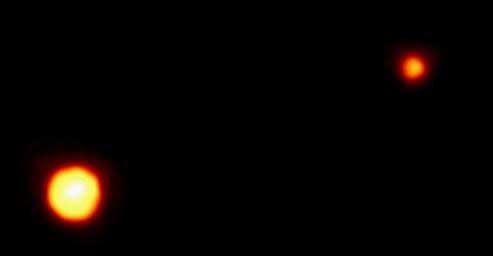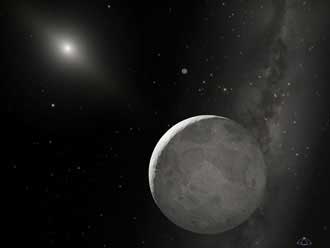
Pluto and Charon
Or
Equal Rights for Pluto, Xena and Sedna?
|
How many planets are there? Eight, nine, ten, more? Is Pluto a planet? What about the other so-called heavenly bodies astronomers are discovering? This August 14-25, 2006 Pluto and some of its neighbors are getting a turn in the celestial spotlight, or finding themselves on the chopping block, depending on how you look at it. During this time the International Astronomical Union will decide on the definition of a planet as well as what to officially name some of the newest denizens of the solar system. Pluto was discovered in 1930 by 24-year-old Clyde Tombaugh. Crowned the ninth planet and named for the Roman god of the underworld, it became an international sensation and drummed up plenty of good PR for astronomy. People went so Pluto-crazy that Walt Disney even named a cartoon character in Pluto's honor, leaving many children born in later years assuming that the planet had been named after the dog, not the other way around. Pluto has since faded in importance compared to the rest of the planets. My science teacher once taught us this mnemonic device for remembering the planets: "Mercury, Venus, Earth, Mars and Jupiter form Mary Very Easily Makes Jam, then SUN, which stands for Saturn, Uranus and Neptune, and then there's Pluto, out in the doghouse." We forget how much there is to appreciate about Pluto. According to Dr. Alan Stern in Pluto at 75: A Uniquely American Anniversary: "Not even Tombaugh and his mentors could have forecast how fascinating their new planet would turn out to be. For eventually, when the technology of astronomy made the detailed investigations of bodies as far away and faint as Pluto-Charon possible, this distant planet-satellite pair turned out to be full of enticing surprises. For the ninth planet was revealed to be the first known world with a satellite so large it could be called a double planet, a world with complex seasons and a chaotic orbit, and the only planet with an atmosphere that freezes out and then is reborn every orbit. Pluto, replete with polar caps and fresh snows of not one, but three exotic surface ices—methane, nitrogen, and carbon monoxide—is an exotic wonderland on the ragged edge of the solar system's vast outer wilderness." Tombaugh didn't just discover Pluto, he also opened the door to the discovery of what Stern calls the solar system's third major zone, "the distant and icy Kuiper Belt." So what is a planet? If size is an indicator, Pluto doesn't have much going for it. Its mass is only .2 percent of Earth's. It's smaller than not only all the other eight planets but also than seven of their moons, including our own moon. There's speculation that Pluto and its moons are simply some of Neptune's moons knocked off course or just one of many Kuiper Belt objects that have wandered into the Sun's gravitational pull. In fact, the American Museum of Natural History demoted Pluto to "Kuiper Belt object." |
|
|
Materially, Pluto appears to consist of rock and ice. The fact that it does have a moon should count for something. As if realizing its status was shaky, Pluto seemed to conveniently muster up two additional moons (discovered in February 2006 and named Hydra and Nix) as if to say, "Hey, guys, look! I've got three moons, not just one! How about it?" We know now that the solar system is a lot more crowded than was presumed in 1930. Rather than being out in the doghouse, Pluto has plenty of company in the Kuiper Belt, and the Oort cloud. |
|
In 2005, along came 2003 UB313. It's larger than Pluto. It has a moon. Some astronomers say you don't let Pluto in the club without letting it in as well. According to Mike Brown, one of the discoverers of UB313: "There is no good scientific way to keep Pluto a planet without doing serious disservice to the remainder of the solar system." The IAU currently refers to UB313 as a Trans-Neptunian object. At the conference, the organization will determine its status, as well as its name. UB313 is currently code-named Xena after TV's warrior princess character; its moon is called Gabrielle after Xena's sidekick. |
 Planet Xena with its moon, Gabrielle |
 Lucy Lawless as Xena, warrior princess |
Brown says Xena and Gabrielle are only code names and "There is no chance whatsoever that these will become the permanent names of these objects!" Excuse me? What could beat Xena? Not only is it the coolest name ever for a planet, but it rather adequately describes how Xena the warrior planet stole the thunder of Sedna (2003 VB12), discovered in 2004 and code-named for an Inuit goddess who mostly stays under water. Sedna has gone from being a possible tenth planet contender to merely an asteroid (its official name is to be decided by the IAU Committee on Small Bodies Nomenclature). Okay, if the name "Xena" doesn't cut it, how about "Mrs. Peel" in honor of the character played by Diana Rigg on "The Avengers"? Or better yet, "Diana," which is, after all, also the name of a Greco-Roman goddess and can thus keep purists happy. |
 Diana Rigg as Mrs. Emma Peel in "The Avengers" |
So, what is the answer? Do we grandfather in Pluto, giving it honorary planetary status for its 76 years of good behavior? Do we extend our hands and welcome everyone to the party? Or do we treat Pluto, Sedna and Xena like a bunch of pathetic wanna-be social climbers? After all, as Christine Lavin so eloquently put it in her song "Planet X": "It's Pluto the planet they love, it's not Pluto the comet, it's not Pluto the asteroid they wonder about above."
So far, it appears that the IAU will not demote Pluto. According to the IAU: "Recent news reports have given much attention to what was believed to be an initiative by the International Astronomical Union (IAU) to change the status of Pluto as the ninth planet in the solar system. Unfortunately, some of these reports have been based on incomplete or misleading information regarding the subject of the discussion and the decision making procedures of the Union. No proposal to change the status of Pluto as the ninth planet in the solar system has been made by any Division, Commission or Working Group of the IAU responsible for solar system science. "
But it's a rather hollow victory. While the the rest of us ignoramuses may rejoice at Pluto's reprieve, astronomers know better. In a sort of insider-ish, wink-wink, nudge-nudge fashion they are indulging in the knowledge that Pluto has simply been given cultural, historical, and sociological planetary status to please the populace, and this doesn't add up to much from a scientific standpoint.
Perhaps the solution is for us to simply thumb our noses at the whole planetary status thing. Who wants to be a planet anyway, when it's way cooler (literally and figuratively) to be a Kuiper Belt or Oort Cloud object? Who needs those insular planets who can't see past their own sun when you can have one eye on the solar system and the other looking far out over the rest of the galaxy? Being a KBO or OCO could be the ultimate in outsider chic!
Fans of Pluto, Xena, Sedna et al await the IAU's decision and look forward to what the future holds. New Horizons, carrying a canister with Tombaugh's ashes, is set to encounter Pluto in 2015 and head into the Kuiper Belt in 2016.
Update: Pluto was in fact demoted, saddled with the designation of "dwarf planet." Fellow dwarf planet and moon Xena and Gabrielle were named Eris and Dysnomia, respectively. Eris is the Greek goddess of discord and strife; Dysnomia is her daughter, the spirit of lawlessness. According to the IAU Eris's claim to fame is that after being left off the guest list to an exclusive wedding, she retaliated by causing a quarrel that led to the Trojan War.
Meanwhile, Pluto fans are rallying to the cause. You can read up on their doings at the Society for the Preservation of Pluto as a Planet (and make a donation to the cause?) or buy a "Honk if Pluto is still a planet" bumper sticker or a "Save Pluto" T-shirt . Yes, there's money to be made from Pluto's plight.
EighthSquare.com P.O. Box 580, New York, NY 10113 ©2006

 Pluto and the
moons: Charon, Hydra and Nix
Pluto and the
moons: Charon, Hydra and Nix